Published: 2012-12-03
Reviews: 22005
Historical Review.
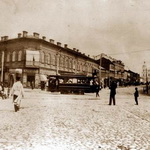 Vitebsk is one of few cities that can boast not only its historical heritage, but also rich traditions transmitted from generation to generation for centuries. To learn the mystery of the great city, it is not enough to walk on the flowery streets, you must search the history of Vitebsk. After all, only knowing the past, we can grasp the future.
Vitebsk is one of few cities that can boast not only its historical heritage, but also rich traditions transmitted from generation to generation for centuries. To learn the mystery of the great city, it is not enough to walk on the flowery streets, you must search the history of Vitebsk. After all, only knowing the past, we can grasp the future.
Ancient people lived on Vitebsk lands before the foundation of the city, archaeologists have found traces of the Dnieper-Dvina (Baltic) culture (VIII century BC - IV-V centuries AD), as well as the Bantserovo culture (VI-VIII centuries AD).
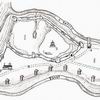 974 - according to Vitebsk Chronicle of XVIII century, that year Princess Olga founded the city of Vitebsk. Historians call the reliability of this version in question as Princess Olga died in 969.
974 - according to Vitebsk Chronicle of XVIII century, that year Princess Olga founded the city of Vitebsk. Historians call the reliability of this version in question as Princess Olga died in 969.
992 - Vitebsk was Christianized, the Church of the Holy Mother of Godon was build on Bald Mountain.
1021 - Vitebsk was first mentioned in "Sofia First Chronicle."
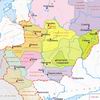 1165 - the city became the center of Vitebsk Principality.
1165 - the city became the center of Vitebsk Principality.
1240-1245 - Vitebsk Principality is in a close alliance with Novgorod lands led by Alexander Nevsky at that time. In 1235 Alexander Nevsky visited Vitebsk to create a military alliance. Vitebsk troop participated in favour of Alexander Nevsky in the Neva Battle (1240) and in the Ice Battle (1242). In 1245 Alexander Nevsky troop took part in defending the city from the Lithuanian feudal lords.
1318-1320 - Vitebsk was given, to the daughter of Prince Vitebsk Yaroslav as a dowry, who married Lithuanian prince Olgerd. Consequently Vitebsk became a member of the Grand Duchy of Lithuania (Prince Olgerd headed GDL in 1345).
1351 - the construction of the stone walls of the Upper and Bottom castles in Vitebsk was finished.
1410 - Vitebsk banner took part in the Battle of Grunwald in favour of the troops of Polish king Vladislav Jogaila.
1413 - Vitebsk was visited by Jerome of Prague, a close team-mate of Czech national hero Jan Hus. During his stay in Vitebsk Jerome of Prague preached the Protestant Christianity.
 1506 - Vitebsk province was founded in the Grand Duchy of Lithuania. Vitebsk became the centre of the new foundation. During the wars of the XVI century in Vitebsk lands there were bloody battles, the city was burnt many times. The city burnt during the Russian-Lithuanian War of 1512-1522, during the Russian-Lithuanian War 1534-1537, during the Livonian War in 1558-1583 Vitebsk suburbs were burnt once again.
1506 - Vitebsk province was founded in the Grand Duchy of Lithuania. Vitebsk became the centre of the new foundation. During the wars of the XVI century in Vitebsk lands there were bloody battles, the city was burnt many times. The city burnt during the Russian-Lithuanian War of 1512-1522, during the Russian-Lithuanian War 1534-1537, during the Livonian War in 1558-1583 Vitebsk suburbs were burnt once again.
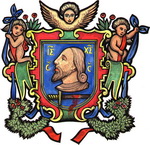
 March 17, 1597 - King Sigismund III of Poland granted the Magdeburg Law to Vitebsk and granted its own Coat of Arms. The first wooden city hall was built in the city.
March 17, 1597 - King Sigismund III of Poland granted the Magdeburg Law to Vitebsk and granted its own Coat of Arms. The first wooden city hall was built in the city.
1623 - the city was deprived of the Magdeburg Law. The reason for this was the uprising of the locals against Bishop Josaphat Kuntsevich, who was killed during the riots. The City Hall as a symbol of self-government has been destroyed.
1640-1644 (or 1649) - Vitebsk housed the Jesuit Order. The Jesuit Church of St.Joseph was built and the Jesuit School was opened.
November 25, 1644 - King of the Polish-Lithuanian Commonwealth Vladislav IV regained the Magdeburg Law and the coat of arms to the city. This was the monarch's gratitude for the courage of Vitebsk warriors in the battle against Moscow army.
1654 - Vitebsk siege during the Russian-Polish War of 1654-1667. A major battle took place near the city walls.
 1656 - Vitebsk was visited by Russian Tsar Aleksei Mikhailovich. While visiting the city on the Dvina hill the tsar arranged a grand feast for Vitebsk residents, attended by Belarussian enlightener Simeon of Polotsk.
1656 - Vitebsk was visited by Russian Tsar Aleksei Mikhailovich. While visiting the city on the Dvina hill the tsar arranged a grand feast for Vitebsk residents, attended by Belarussian enlightener Simeon of Polotsk.
1701 - Peter I visited Vitebsk to arrange the staff of the Russian troops participating in the Northern War. It was not the first and not the last visit of Vitebsk by the Russian tsar. For the first time he was here in 1695.
 September 18, 1708 - Vitebsk was burnt by the order of Russian Tsar Peter I. The reason was the secret information on the financial support of Swedish troops by the Vitebsk nobility, who fought against Russia during the Northern War.
September 18, 1708 - Vitebsk was burnt by the order of Russian Tsar Peter I. The reason was the secret information on the financial support of Swedish troops by the Vitebsk nobility, who fought against Russia during the Northern War.
1760 - philistine M.Pantsyrny released "Vitebsk Chronicle." That it was the first indication of the date of the foundation of Vitebsk.
1772 - as a result of the first partition of the Polish-Lithuanian Commonwealth Vitebsk became a member of the Russian Empire with a population of just over 3 thousand people. The city became the centre of Vitebsk area, which was a part of Polotsk province.
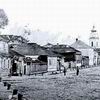 1775 - a stone City Hall was built in Vitebsk. It is worth noting that only Vitebsk and Shklov City Halls had towers at that time.
1775 - a stone City Hall was built in Vitebsk. It is worth noting that only Vitebsk and Shklov City Halls had towers at that time.
1777 - Garnovsky tannery became the first industrial enterprise in Vitebsk.
 1781 - Russian authorities approved a new Coat of Arms of the city - "Chase" on the white-red-white background.
1781 - Russian authorities approved a new Coat of Arms of the city - "Chase" on the white-red-white background.
1794 - a public school appeared in the city. The initiator of its foundation was Belarusian governor-general P.Passeka. At the same time the first secular library in Vitebsk appeared. It was opened in the public school accounted for were only a few dozen of books.
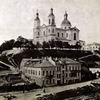 December 23, 1796 - Vitebsk became the centre of Belarusian (since March 11, 1802 - Vitebsk) province.
December 23, 1796 - Vitebsk became the centre of Belarusian (since March 11, 1802 - Vitebsk) province.
1797 - provincial printing office opened in Vitebsk, which has successfully operated with few interruptions until 1917.
September 9, 1808 - the first men's gymnasium was opened in the city in the result of transformation of the public school.
1810 - a meteorological station, a religious school and a cloth manufacture appeared in the city.
 1812 - from July 16 to October 26, Vitebsk was occupied by French troops. The General Headquarters of the French forces was located in the city. August 3, 1812 - in the Governor's Palace in Vitebsk, the Emperor of France Napoleon celebrated his 43rd birthday.
1812 - from July 16 to October 26, Vitebsk was occupied by French troops. The General Headquarters of the French forces was located in the city. August 3, 1812 - in the Governor's Palace in Vitebsk, the Emperor of France Napoleon celebrated his 43rd birthday.
1814 - the first stone bridge over the river Vitba was built.
 1820 - Alexander Pushkin visited Vitebsk for the first time. The great Russian poet and writer visited Vitebsk once again in 1824.
1820 - Alexander Pushkin visited Vitebsk for the first time. The great Russian poet and writer visited Vitebsk once again in 1824.
1827 - Vitebsk authorities launched street lighting for the first time (since 1851 the lighting used gas).
1834 - first in the territory of Belarus, a seminary for training teachers of primary school (Vitebsk teaching seminary) was opened in Vitebsk.
1853 - Fire and Rescue Service appeared in Vitebsk, the first fire brigade was formed.
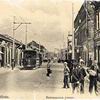 1854 - the construction of Smolensk-Vitebsk highway was finished.
1854 - the construction of Smolensk-Vitebsk highway was finished.
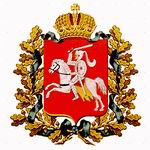 1856 - Russian Emperor Alexander II approved a new Coat of Arms of Vitebsk. The coat of arms was the well-known "Chase", surrounded by a ribbon of St.Andrew. At the top of the coat of arms was the Russian imperial crown.
1856 - Russian Emperor Alexander II approved a new Coat of Arms of Vitebsk. The coat of arms was the well-known "Chase", surrounded by a ribbon of St.Andrew. At the top of the coat of arms was the Russian imperial crown.
1866 - Riga-Orel railway passed through the city, which then connected the city to Moscow, St.Petersburg and Kiev.
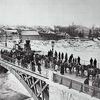 1867 - a stone bridge over the river Western Dvina was built.
1867 - a stone bridge over the river Western Dvina was built.
1878 - Vitebsk brewery was founded.
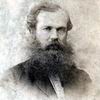 1881-1882 - little-known Vitebsk photographer Sigismund Yurkovsky constructed the world's first instant photographic shutter, which was subsequently released by British "Hera" and "Garnton Pikor".
1881-1882 - little-known Vitebsk photographer Sigismund Yurkovsky constructed the world's first instant photographic shutter, which was subsequently released by British "Hera" and "Garnton Pikor".
December 23, 1885 - birthday of the telegraph in Vitebsk.
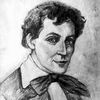 July 6, 1887 - Marc Chagall (1887-1985) was born in Vitebsk - Belarusian and French painter, one of the most famous representatives of the artistic avant-garde in the world.
July 6, 1887 - Marc Chagall (1887-1985) was born in Vitebsk - Belarusian and French painter, one of the most famous representatives of the artistic avant-garde in the world.
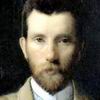 1891 - Yudel Peng (1854-1937) settled in Vitebsk - a famous Russian and Belarusian painter, Marc Chagall's teacher. in Vitebsk Y.Peng founded Russia's first Jewish Art School (converted in Vitebsk city school by Marc Chagall), so in the 20s of the XX century the city became the center of Russian avant-garde.
1891 - Yudel Peng (1854-1937) settled in Vitebsk - a famous Russian and Belarusian painter, Marc Chagall's teacher. in Vitebsk Y.Peng founded Russia's first Jewish Art School (converted in Vitebsk city school by Marc Chagall), so in the 20s of the XX century the city became the center of Russian avant-garde.
 1892-1900 - Russian painter Ilya Repin lived in estate Zdravnevo near Vitebsk.
1892-1900 - Russian painter Ilya Repin lived in estate Zdravnevo near Vitebsk.
1894 - first city water supply appeared in Vitebsk. The merit for the appearance of the water supply in the city belongs to Felix Tsehanovetsky.
July 1895 - in Vitebsk O.Drevnitskaya made her first parachute jump. She became the world's first female parachutist.
1897 - the first electric power station was built in Vitebsk.
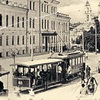
 June 18, 1898 - Belarus first electric tram was launched (the inventor – Vitebsk resident Pirotsky). Vitebsk became the fourth city in the Russian Empire after Kiev, Nizhny Novgorod and Ekaterinoslav, in which tram lines appeared.
June 18, 1898 - Belarus first electric tram was launched (the inventor – Vitebsk resident Pirotsky). Vitebsk became the fourth city in the Russian Empire after Kiev, Nizhny Novgorod and Ekaterinoslav, in which tram lines appeared.
1905 - cinema came to the city, the first cinema theatre was opened. However, the first film show was held in Vitebsk in 1898 in the yacht club on the bank of the Western Dvina River.
August 27, 1917 - elections were held in the Vitebsk City Council.
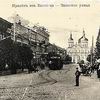 November 9, 1917 - the city proclaimed the Soviet power, Revolutionary Military Committee was formed.
November 9, 1917 - the city proclaimed the Soviet power, Revolutionary Military Committee was formed.
1918 - Vitebsk Provincial Museum was created (now Vitebsk Regional Museum). The basis of the museum is the personal collection of A.Brodovsky.
November 13, 1918 - city Komsomol organization was created in Vitebsk, which has become one of the first in Belarus.
1918-1922 - Russian and Belarusian avant-garde painters worked in Vitebsk in the early 20's. Marc Chagall - 1918-1920., Vasily Kandinsky and Mstislav Dobuzhinsky - 1918-1920., El Lisitsky - 1918-1920., Falk - 1918-1920., Kazimir Malevich - 1918-1922.
 1919-1920 - world-famous Jewish painter and architect Lazar Lisitsky (1890-1941), one of the founders of Suprematism, along with Kazimir Malevich, taught Vitebsk art school, invited by Marc Chagall.
1919-1920 - world-famous Jewish painter and architect Lazar Lisitsky (1890-1941), one of the founders of Suprematism, along with Kazimir Malevich, taught Vitebsk art school, invited by Marc Chagall.
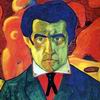 November 1919 - autumn 1922 - the founder of Suprematism Kazimir Malevich (1879-1935) lived and worked in Vitebsk. in Vitebsk Art School Kazimir Malevich directed the workshop of "a new revolutionary model". During his life in Vitebsk, Kazimir Malevich produced several papers in theory, justifying Suprematism as a new form of art, including his major paper "Suprematism. The world as pointlessness or eternal peace."
November 1919 - autumn 1922 - the founder of Suprematism Kazimir Malevich (1879-1935) lived and worked in Vitebsk. in Vitebsk Art School Kazimir Malevich directed the workshop of "a new revolutionary model". During his life in Vitebsk, Kazimir Malevich produced several papers in theory, justifying Suprematism as a new form of art, including his major paper "Suprematism. The world as pointlessness or eternal peace."
June 1921 - in Vitebsk appeared the BSSR first TB dispensary.
March 3, 1924 - the city became part of the Belarusian Soviet Socialist Republic. The decision was taken by the CEC of the USSR.
 1925 - Zaire Azgur (1908-1925) - one of the most reputed sculptors - graduated from Vitebsk Art School. One of the teachers of Zaire Azgur during his studies in Vitebsk was Marc Chagall.
1925 - Zaire Azgur (1908-1925) - one of the most reputed sculptors - graduated from Vitebsk Art School. One of the teachers of Zaire Azgur during his studies in Vitebsk was Marc Chagall.
1926 - The second Belarus State Theatre was opened in Vitebsk (now Yakub Kolas Theatre).
 1934-1939 - the future leader of the Belarusian SSR, the Soviet Union Hero Petr Masherov studied in Vitebsk Kirov Pedagogical Institute.
1934-1939 - the future leader of the Belarusian SSR, the Soviet Union Hero Petr Masherov studied in Vitebsk Kirov Pedagogical Institute.
1936 - born in Vitebsk, Vitebsk resident, weightlifter D.Naumov set a world record in the bench with both hands for the light heavyweight athletes.
1937 - paintings of Vitebsk Art School artists I.Akhremchik, Y.Peng, H.Darkevich participated in an international art exhibition in Paris.
1938 - Vitebsk region appeared on the map. Vitebsk became the centre of the region.
July 11, 1941 - June 26, 1944 - years of occupation of Vitebsk by Nazi invaders. In the city there were active anti-Nazi underground resistance. During the occupation the city was completely destroyed, after the liberation of the city only 118 residents survived.
Summer-autumn 1941 - mass murder of prisoners of Vitebsk ghetto. During just a few months in the main Tulov (Ilovsk) ravine 16-18 thousand people were shot.
1945-1955 - post-war reconstruction of the city, construction of new enterprises: Komintern Machine Tool Plant (1946), Kirov Machine Tool Plant (1946), a carpet factory (1947), a furniture factory, a woodworking plant, Vitebsk CHP (1953), silk woven factory (1955).
December 30, 1948 - Yakub Kolas Drama Theater actor Pavel Molchanov was awarded the title People's Artist of the USSR.
December 21, 1953 - Yakub Kolas Drama Theater actor Alexander Ilyinsky (1903-1967) was awarded the title People's Artist of the USSR.
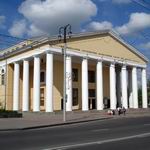 1958 – two major cultural buildings appeared in Vitebsk that year - the first widescreen cinema "October" and the new building of Yakub Kolas Theater.
1958 – two major cultural buildings appeared in Vitebsk that year - the first widescreen cinema "October" and the new building of Yakub Kolas Theater.
August 20, 1959 - archeologist discovered Belarus first birch-bark scroll (the XIII century) in Vitebsk on Freedom Square (in the basement of the Alexeev monastery).
1959 - TV tower at Yuryevo Hill was commissioned in Vitebsk, and the first television program of the Central TV launched broadcasting. Less than a year later, April 20, 1960, Vitebsk TV studio began its activity.
 1964 - Vitebsk resident Romuald Klim won the XVIII Olympic Games in Tokyo.
1964 - Vitebsk resident Romuald Klim won the XVIII Olympic Games in Tokyo.
February 8, 1967 - Vitebsk was awarded the Order of Lenin.
August 1968 - Vitebsk Airborne Division was put into the territory of Czechoslovakia.

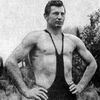 1968 - Vitebsk borns gymnast Larisa Petrik, weightlifter Romuald Klim, wrestler Alexander Medved became champions of the XIX Olympic Games in Mexico City.
1968 - Vitebsk borns gymnast Larisa Petrik, weightlifter Romuald Klim, wrestler Alexander Medved became champions of the XIX Olympic Games in Mexico City.
October 28, 1974 - in the 1000 anniversary, Vitebsk was awarded the Order of the Labour Red Banner.
 April 2, 1975 - Vitebsk actor and film director Fyodor Shmakov was awarded the honorary title "People's Artist of the USSR".
April 2, 1975 - Vitebsk actor and film director Fyodor Shmakov was awarded the honorary title "People's Artist of the USSR".
 July 19, 1988 - Summer Amphitheatre was opened in Vitebsk, which later became the main venue of the international festival "Slavic Bazaar".
July 19, 1988 - Summer Amphitheatre was opened in Vitebsk, which later became the main venue of the international festival "Slavic Bazaar".
July 18, 1992 - this date is the birthday of the international festival "Slavic Bazaar", which remained in Vitebsk for many years.
1999 - Free Economic Zone "Vitebsk" was created.
2009 - the city got once again new heraldic symbols - a Coat of Arms and a Flag.





